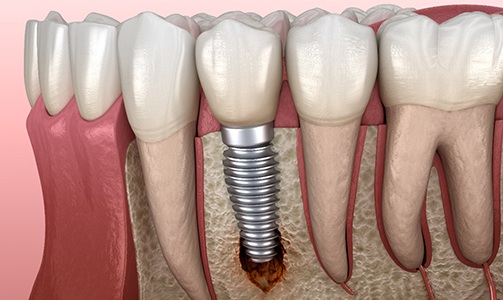Dental Implant Failure & Salvage Idaho Falls
Helping Patients with Loose or Damaged Implants

From the high-quality material they’re made of to their strong bond with the jawbone, there are many reasons why dental implants are extremely successful when it comes to replacing missing teeth. However, no treatment is perfect, and on rare occasions, dental implants may fail due to various reasons. Dr. Cline can quickly identify the underlying problem with your implants and put together a plan for restoring your oral health and protecting your smile. Call our Idaho Falls dental office right away if you have any reason to be concerned about your dental implants.
Why Choose Cline Family & Cosmetic Dentistry for Dental Implant Salvage?
- Entire Dental Implant Process Performed In-House
- Multiple Types of Relaxing Dental Sedation
- Dentist with State-of-the-Art Training
Why Do Dental Implants Fail?

Some of the most common reasons dental implants might fail include:
- Infection: Sometimes harmful oral bacteria may infect the tissues that are responsible for holding the dental implant in place. These tissues may eventually lose their ability to support the implants if they become too badly damaged.
- Unsuccessful Osseointegration: The osseointegration process is when the dental implant posts fuse with the jawbone. Certain factors – such as specific health conditions – can stop osseointegration from taking place, resulting in implant failure.
- Trauma: A blow to the mouth or face can damage your dental implants or the tissues around them.
Symptoms of Failed Dental Implants

Dental implants might fail shortly after they’re placed or decades later. Regardless of the timing, the symptoms you notice will largely be the same. Common warning signs include:
- Pain that is more severe or lasts longer than what can typically be expected after dental implant placement surgery.
- An implant that feels loose. (Note that this could just be a problem with the restoration and not the actual implant, but you should still have the issue checked as soon as possible.)
- Bleeding, swelling, pus, and any other symptoms that might mean the area around the dental implant has become infected.
- Having trouble chewing. (Dental implants should normally be strong and stable enough to handle virtually any kind of food.)
How Dental Implant Salvage Works

The details of the dental implant salvage process can vary depending on your specific situation. After examining your mouth, we can explain your treatment options in more detail. Sometimes it’s possible to save the dental implant posts, but in severe cases removing them might be necessary. After your treatment is complete, we may be able to place new dental implant posts to once again complete your smile.

